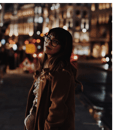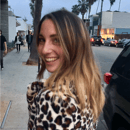For me, life was walking through a house of distorted mirrors. People were the mirrors and the distortion was my latinidad. I was so terrified that other people could tell that I was brown that I spent a lot of time trying to fool the mirrors. I never took it upon myself to learn Spanish because it felt like poison sliding off my tongue. I remember training myself to let go of my “axed” pronunciation of “asked” because it was “ghetto”. Everything that reflected my Mexican culture was “ghetto” to me and I thought I was better off without it. I truly believed I was better than those “ghetto” Mexicans because I “knew better” than to “be a Mexican” in public.
Even worse, one of my friends from high school had told me that I wasn’t like “other Mexicans” because I actually tried in school. No, I wasn’t offended. I actually took pride in the fact that I was “different” and that she could tell. At the end of the day, all I wanted was to be identified by others as white and the more of my latinidad I could erase, the more I did.
I did this for six years of my life. It wasn’t until I took “Chicano Studies 187: Language, Power, & Learning” with Professor Bucholtz that I changed my mind. This course taught me about microaggressions, the power structures that work against Latinx people in academic settings, and that I wasn’t as woke as I thought. I remember coming home to my freshman dorm and telling my roommate that I actually knew nothing but that this class was giving me the tools to become the woke person I wanted to be. Little did I know, I was also undergoing a transformation of thought.
Over the course of ten weeks, students shared their experiences in lecture. I was confronted with many Latinx people who were proud of who they were, even amidst the virulent racism and the political climate of the 2016 elections. There was something comforting in an environment where people looked like me. I hadn’t had many Latinx friends in middle and high school. Amongst the few I did have, we never really talked about what it was like being Latinx. In this space, being apart of the Latinx community wasn’t bad. It wasn’t ugly. It was all love. It was good.
That was really it. That’s what changed my mind. There was positivity about being Latinx. It was the first time that I felt being a Latina was a good thing. This course and the Latinx students in it demonstrated to me that I should love my culture, my people, and most importantly, myself. I was in awe of how much they loved being brown and how Spanish is a beautiful language. Slowly, I was able to rework my brain to see how I was wrong because it’s neither easy nor fast to change what you’ve been thinking for years. As cheesy as it sounds, this class has changed my life and I am so thankful for my classmates, my TA, and Professor Bucholtz for enabling me to become comfortable being Latina. That is one of my greatest transformations.
Racist America thrived on my internalized racism but it doesn’t anymore. I no longer look in the mirror and see distortion. I see my beautiful brown skin and I’m proud of who I am.
All photos by Rosalie Rubio



